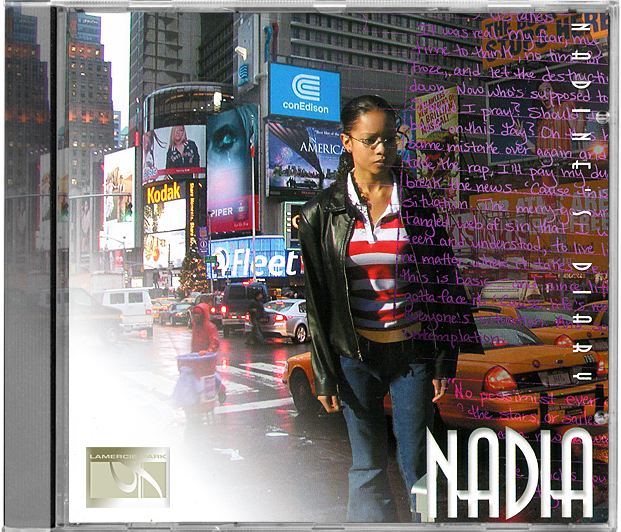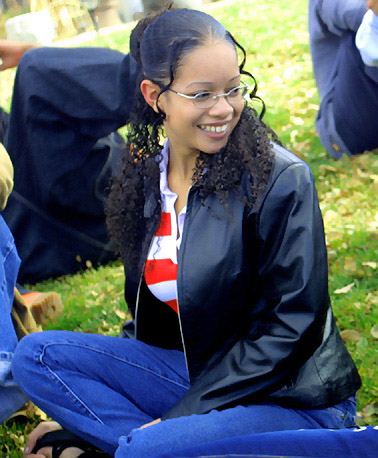
Ghost Stories
I’m never quite sure what to say about Nadia, so, instead, I’ll
say a few things about Nadia’s grandmother Saundra, whom we all
called Sam. Sam was what you might call “a character.” She had a
singular dry wit that made her rather inscrutable. I could never
tell whether Sam actually liked me or not. She lived close by
and allowed me in her home, so I’m going to err on the side of
caution and say that, if she fell short of actually liking me,
she certainly tolerated me. I would under absolutely no
circumstance ever get into a poker game with her. She had one of
those faces: you just could not tell a thing about her. Her
amused face was precisely the same as her bored face was
precisely the same as her annoyed face. She simply was. Every
now and then she’d kind of let you off the hook and say
something outrageously funny, usually breaking up whatever
circle she’d become the center of at that moment. I will confess
that I loved Sam, even if I could never be sure that she loved
me back. I would have done anything for her but she asked for
very little and it annoyed her even to ask for that. Sadly, Sam
passed away a few years ago. Nadia, now a grown woman with her
own family, is a virtual stranger. I’m sure some or all of this
paragraph applies also to her but, truth is, as bewildering as
Sam was personally, Nadia is even more so. If there is an inner
circle who knows what winds her clock, I’m certainly not part of
it.
I spent six weeks in the summer of 2000 alone with Nadia at
my house. She was thirteen and a half. I’ve always prided myself
with being good with kids and, truth is, I tend to fall in love
with every kid I meet. Nadia was no exception, but the bonding
seemed to be going in only one direction. She was, initially, a
very playful, curious, energetic pint-sized drain on my
batteries, constantly reading me her poetry and bouncing around
the studio. At some point, she seemed to withdraw. She’s never
said why or, frankly, spoken about it at all. Today I could hold
a gun to her head and she’ll still refuse to sing any of the
music we created together. I exhausted my options in the last
weeks of our time together attempting to draw her out, talking
to Sam and her pastor and whomever else might have a clue, but
to no avail. She was always perfectly polite and the most
obedient and thoughtful little girl I have ever known in my
life. I have no idea at all if it was something I said or did or
if there was something going on with her life or some
combination of which, but she just kind of turned it off and
drifted from whatever semblance of a friendship we’d begun.
Today she’s kind of this ghost I pass in hallways and have to
remind her to say hello to me.
I don’t pretend to know who Nadia is anymore, but I can tell you
who she once was. She was an exceptionally bright, quick-witted
skinny little kid in braids and Farmer Billy Bob coveralls who
could sing her lungs out. She had a stunning,
professional-quality “grown-up” voice emitting from that tiny
body of hers. It was simply dazzling to watch, to see her
standing there with that sound coming out of her. Her voice was
raw and untrained. She preferred roaming basement halls in this
unlikely contralto, but I knew she could be belting out soprano
notes if I hammered her toes a little. Getting her to open up
and let loose as a singer was my overall goal when I stupidly
offered to record her over some existing tracks as a little demo
tape back in ‘2000. I was curious to see what she might do with
some of that old material, and she surpassed all of our
expectations. So I kept going. And, maybe that’s where I lost
her, when studio time became less about fun and more about
tedious, repetitive work. I told her she could bail at any time,
nobody would be mad at her. But every day I went to pick her up,
there she was, on the steps, in braids and coveralls. If she
hated what she was doing, she never expressed it. Frankly, there
were days when she wouldn’t speak at all. Not on the drive over
or back. Not hello or good-bye. She’d just kind of be;
sitting in a corner until I was ready for her. Then she’d light
up, belt out her tracks, and fade back to zombie child. This
worried me a great deal, but none of the responsible adults in
her life seemed all that concerned: that’s just Nadia. It
frustrated me to no end that my kid mojo wasn’t working on her.
I was in love with her but we were far from friends. It was, in
the end, one of the least pleasant recording projects I’ve done.
Aside from remixing Minister Darryl Cherry’s live album in 2005,
it was also the last.

I Don't Need A Hug
In the
summer of 2000, I spent six weeks working with an extraordinary
young girl from my church. Nadia was a
frail, overly polite wisp of a girl who sang a capella
renditions of Alone In The Garden and Jesus Loves Me in church.
Earlier in the year, the pastor and I worked up a very
quick sketch of Nadia singing those a capella numbers to send
off to music interests in New York. The quickie disc became a
popular gimme at the church and among Nadia's friends and
family, and eventually began circulating in a fairly wide
circle. Wide enough for me to be embarrassed by the poor quality
of our little rush job demo. Nadia was a tremendously gifted
young woman who, at 13, possessed an ethereal, angelic voice and
surprising vocal and emotional range. Still raw and untrained,
Nadia drifted toward Mariah Carrey and Christina Aguilera, with
a rich, professional-grade tone and unexpected transparency in
her upper range.
When the pastor wanted more copies of our crappy demo to ship
around the country, I decided to take Nadia into the studio— a
place of loathing for me— and develop a better quickie demo for
her. I figured we'd try three or so songs, mostly tracks
prepared by R&B singer/songwriter/producer Bari. But,
once I got her in the studio and began to experiment with
different things, new and varied possibilities presented
themselves. So much so that we ended up working on about twelve
songs, including more polished versions of ...Garden and
Jesus
Loves Me.
The resulting demo became an instant hot property around the
church and elsewhere. I suddenly rose from obscurity to
becoming, "The guy who did that demo with Nadia." While it
wasn't perfect, not by a long shot, Nadine's Diary, I believe,
fairly demonstrated that young person's enormous gifting and
potential.
I kept digital audio recorders rolling from the moment she
arrived until the moment she left, my own Nanny Cam of sorts,
intended to document the time we spent together. At night, I'd
go over these discs, hoping for a glimmer of who Nadia was, finding only the impeccably obedient child with the world's
greatest poker face.
I kept in some of this open mic stuff, catching Nadia in the act
of being Nadia— the playful childlike giggle sounding absolutely
nothing like the brassy alto she morphs into when the tape
starts rolling— but Nadia absolutely hated that stuff and
insisted I take it off the original demo. I ended up cutting two
separate versions of the album: one with the interlude stuff
and one without. I have to believe, when she emerges from the
painful transition of girl to woman, that she will be grateful
we preserved the giggly child, the actual blow-by-blow in the
studio. Someday, the mature woman (and likely star) Nadia will
be less embarrassed by those moments and more moved by them, by
this, her first experiences behind the mic.
At the end of the day, I think we put together a pretty nifty
disc for where her abilities and my resources were at the time.
I'm sure she's improved by leaps and bounds in the intervening
time, but I know even less about her now than I did then. As a
producer, I kind of beat myself up over this project for not
having broken through Nadia's defenses to get at the real
person in order to put that real person on mylar. The only places on
Nadine's Diary where I feel like we're seeing glimmers of truth
are in the outtakes and interludes she so despised; the
squeaky little kid voice, the antics, the bubbly and tempestuous
child-woman in full moody transition.
I never found my comfort zone with Nadia. I'm usually good with
kids, but with Nadia I couldn't find my zone: do I become dad or
buddy or what. I tried to see myself through her eyes and saw
only smoke and mirrors. I never got to a place where I thought
of us as friends, though she was always extremely polite and
completely obedient. I suppose, on some level, it's unrealistic
to expect all kids to like you— and it's not that I thought
Nadia didn't like me, it's more that she arrived a stranger and
left a stranger, which frustrated me beyond all reason. We spent
six weeks together but we never bonded. And, when the ordeal was
over, there was, I felt, this sense of relief that we'd no
longer be spending ten hours a day in each other's company.
I guess, to that extent, I felt like I failed, somewhere along
the way, to bond with her and to create trust between us to the
point where Nadia would reveal something of herself in her
singing. Her singing is technically proficient but emotionally
starved— something only time and experience will fix.
I didn't hug her. She wasn't a Hug Me person. Kids let you know
when they want to be hugged. Most of the time, they just go for
it. Otherwise they present themselves with the puppy dog sorrow
and the paternal instinct just kicks in. Not with Nadia, who
typically arrived with the Mask of the Phantasm Enigmatic Nadia
Face that told you absolutely nothing about what she was
feeling, but sent the clear message,
I Don't Need a Hug, which
she screams at me in one interlude. Knowing she wasn't a Hug
Me person, I hugged her after her repeated attempts to nail a
tough passage failed. Truthfully, I didn't even shake Nadia's
hand. I respected her no-fly zone and took my cues from her. I
found her curiously distant and ultimately unknowable, which is
not meant as an insult, but an observation of the mutant
condition of many teenagers these days.

Nadine's Diary
I
tended to treat her like glass, which, as her grandmother warned
me, was the complete wrong thing to do. Nadia was made of
sturdier stuff, she told me. Don't be afraid to lean on her and
be tough with her. Be tough with a girl who weighed maybe 90
pounds and looked on the verge of tears most of the time. That
task was, likely, beyond me.
Each day, after I dropped her home, I'd jot down notes on my
computer— idle thoughts I figured would likely end up in liner
notes or memoirs. These were my thoughts during the work in
progress; my feelings about the wondrous and curious stranger in
my basement:
Nadia is this little bundle of contradictions. Too old to be a
child and too young to be a woman. A volatile mix of insecurity
and ego. Always complaining and ready to give up, she plays this
futile game of trying to convince me she's somehow less
luminescent than we both know she is. The novelty of recording
has worn off and she's confronting the sheer boring repetition
of it. It is work, and a lot of it.
I loved it when she got bored. She's too polite to start whining
outright, but she was clearly tired of spending her summer in my
basement. Good. Now she's getting the smallest glimpse of what
the life of a musician is really like. But it's still not quite
the real thing. You know what singers actually do for a living?
They wait. They wait for hours. They spend a lifetime waiting.
Waiting for engineers to finish a mix, waiting for producers to
re-write or to get levels or just waiting because the "star" is
late showing up. When Nadia arrived at my place, I was set up
and we prayed and got to work. In the real world, there is
waiting. And lots of it. Recording is the least glamorous part
of the job. It is joyless, tedious, repetitious, and crushing to
the ego. And, after weeks of sweaty, painstaking work, you end
up with four minutes of music that, if done correctly, sounds
like it took us four minutes to do. And the work is, usually,
quickly dismissed by people who hear it; people who cast off
careless, stupid comments, not realizing the hours of hard work
that went into the song.
Nadia is the most obedient and well-mannered girl I have ever
met. So much so that my primary purpose seems to be to break
down the barriers of gender and age that require such formality.
Occasionally it works, and she ends up forgetting who I am,
screaming at me at the top of her lungs, furious and impatient,
her small fists clenched and her little body going rigid with
rage, and it's all I can do to keep from laughing. Sometimes it
takes us hours to get there, but I know that once I've ticked
her off sufficiently, she'll connect with me and we can stop
treating each other like glass long enough for her to expose
herself emotionally. And maybe I can catch just the smallest
glimmer of that on tape.
In person, she is certainly personable enough, curious about
most everything. Sometimes she asks me for definitions of things
I'm reasonably certain she already knows but is either looking
for confirmation or is having some fun at my expense. Talking to
her on the phone is excruciating. Some girls you just wind up
and let them go and they talk your head off. On the phone, Nadia
contributes little to the conversation; there are long pauses
and I become the court jester, filling the void with witticisms
she does not laugh at and only half hears— which is, pretty
much, as things should be.
I was completely on edge the entire time she was at Eagle's
Nest. Having a young kid in the house, of either gender, is
fraught with peril. There are just so very many negatives
weighed against the real positives of her spending quality time
with a father figure, developing her craft, and investing time
in her spirituality. But it's a nightmare for me because people
are just so evil and jealous and will almost always put a
negative spin on most anything. My ministry and my entire life
could be ruined forever by just a single vicious rumor.
Sometimes I would glance over at her and wonder if she realized
she was holding my life in her hands, and that in a very real
way I was risking that life to work with her. And then I'd see
her, blithely plunking away on the piano, completely ambivalent
to my presence. She seemed totally comfortable around me and
totally comfortable with our relationship; the seeds of doubt or
mistrust either had not been planted or had not taken root. I
was the only one nervous. I was the only one getting the ulcer.
I've never seen her cry. I have a hard time believing she ever
does. It's as if she is afraid to be vulnerable in front of me.
And vulnerability is what is needed here to find that song. What
I don't like about Mariah Carrey is exactly what is happening
with Nadia: it's Emotion On Cue. It's less genuine, and it's
harder for the listener to connect to.
She was reluctant to pray. I preferred to start sessions with
prayer, and I preferred she lead them, but we go into, "No, I
can't, I won't," etc. Then she finally did and she did just
fine. But I worried about her spirituality. The music we were
doing required her to have a very real walk with God. Much as
I'd prefer to see her pursue music ministry, that decision has
to be hers. I was concerned that I was putting words into her
mouth that she could not yet live up to. If and when she
performs this music, she'll have to lead people in worship, and
she'll have to back up these songs with her own testimony,
something I was not certain she fully understood.
The last time she was here she was much more interested in
reading poetry than singing, though she did both quite well. She
reads the poems like she's late for a train, reading so fast you
can almost understand the meaning of the poems but you get none
of the artistry. Typical of the child-woman, the diva in
training, still holding her paint brush. Giggling one moment,
cheerily plunking away at the piano in her best Farmer Bob
coveralls and braids, then bouncing off the walls in full Sugar
Rush Mode, doodling on her lyric sheets. Then, the light switch
flips and she’s the contemplative, introspective, bilingual
Woman I Am, retreating into the shadows with her mic and the
water I must keep demanding she drink to keep her voice from
cracking.
Suddenly so mature, sneering out to potential suitors in
Fall In Love Again Found
someone to hold you tight, someone that you can keep at arm's
length. You keep the conversation light, while you keep building
your fences... But then horrified by the tough subject matter
of lost innocence in Larry Norman's classic
Pardon Me, one of
her best performances here. As you pull the ribbons from my
hair. I practically had to give her a Valium. Confidently belting out the Langston Hughes feminist
affirmation
I’m Gonna Fly,
her best overall performance here, in one take because she
wanted to get out of the studio and cruise around in my Mustang
convertible scarfing French fries and
trading wisecracks with Steve.
She keeps me guessing, wondering what’s going on behind those
eyes that tell you absolutely nothing. The gatekeeper in full
defense mode. The child becoming a woman, insisting on going her
own way while cautious about the bends in a road she’s not
traveled before.
Nadia had a very quick
wit, the kind of shark's tooth sense of humor you'd never expect
from someone quite so angelic. In fact, it was that wit ("Nadia
in her early years," she'd dryly muse) that tells you how
informed, how intelligent a life this is. That she's so much
more than
Alone In The Garden, while at the same time informing
her interpretation of that song.
She loved poetry-- reading and writing it. She'd interrupt
sessions to read me the latest poem she's read in school, or the
latest work of Nadine, her alter-ego, as some of her work was
signed. At the time, Nadine-- an
Americanization of her Latina name-- seemed to me to be a kind
of doppelganger; an invented person the empirically private
Nadia could share her secrets with. Is the girl on this CD Nadia
or Nadine? Only a woman knows for sure. "Well, this woman
doesn't know," Nadia told me, always at least two steps ahead of
me.
Nadia is something. Nadia is a somebody on the verge of
happening. We are all just stewards of God’s grace and His
calling on this life and these great gifts. I’m grateful for
this privilege and responsibility of having played some small
role in this process. I can’t wait to see what comes next.
Christopher J. Priest
October 2013 / November 2004
Home | Blog | Projects | Comics | Rants | Music | Video | Christian Site | Contact
Unless otherwise specified, Copyright © 2013 Lamercie Park. All Rights Reserved.
TOP OF PAGE




